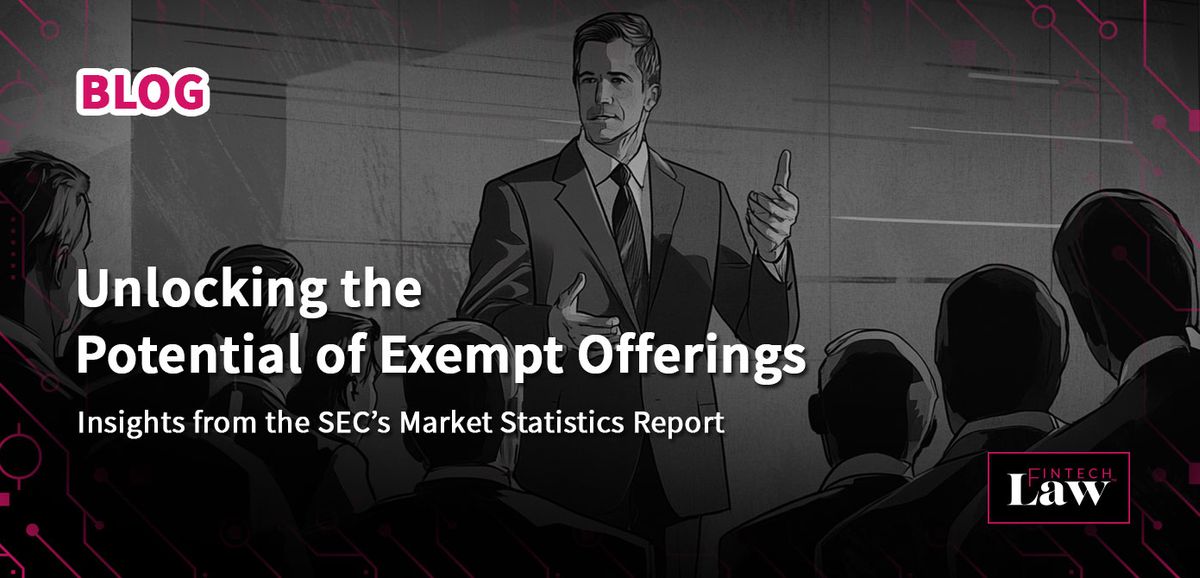Unlocking the Potential of Exempt Offerings

Insights from the SEC's Market Statistics Report
The U.S. Securities and Exchange Commission (SEC) recently released its 2024 report on market statistics for exempt offerings under Regulation A , Regulation D , and Regulation Crowdfunding (CF) .
These exemptions provide companies with pathways to raise capital without the complexity of traditional public offerings. Let's explore this report's trends, data, and implications and how these exemptions continue to shape capital markets.
Understanding Exempt Offerings
Exempt offerings allow businesses to raise funds without complete registration under federal securities laws. Each exemption serves different business needs:
- Regulation A : Enables companies to raise up to $75 million annually through two tiers:
- Tier 1 : Up to $20 million.
- Tier 2 : Up to $75 million.
- Regulation D : This includes rules such as Rule 504, Rule 506(b), and Rule 506(c), which allow offerings ranging from $10 million to unlimited amounts, with varying restrictions.
- Regulation CF : Focused on crowdfunding, allowing companies to raise up to $5 million annually via SEC-registered intermediaries.
Each exemption has specific investor protections, reporting obligations, and eligibility criteria, making them flexible tools for small to midsize companies.
Key Market Trends from the Report
1. Number of Offerings
The report highlights substantial growth in exempt offerings over the years:
- Regulation D remains the dominant exemption, with 56,721 filings in 2023, down from a peak of 65,372 in 2021. This reflects broader market trends, including fluctuating investor sentiment.
- Regulation A offerings have remained relatively stable, with 212 offerings in 2023 compared to 307 in 2022. This slight decline reflects increased competition from other financing methods.
- Regulation CF has shown consistent growth, with 737 offerings in 2023, a significant increase from 146 in 2017. Crowdfunding continues to gain traction among startups and small businesses.
2. Capital Raised
The total capital raised through exempt offerings showcases their growing importance:
- Regulation D led the way, raising $2.75 trillion in 2023, up from $2.36 trillion in 2022. This surge reflects the exemption's flexibility and suitability for more extensive private placements.
- Regulation A offerings raised $1.13 billion in 2023, down from $1.85 billion in 2022. Despite the dip, Regulation A remains a viable option for mid-sized issuers.
- Regulation CF offerings raised $293 million in 2023, up from $329 million in 2022, reflecting increased adoption of crowdfunding as a mainstream financing method.
Implications for Businesses
Flexibility Across Industries
The exemptions cater to various industries, from technology to manufacturing. Regulation D, in particular, has been instrumental for mature private companies raising large sums, while Regulation CF supports early-stage startups.
Accessibility for Small Issuers
Regulation CF has democratized capital raising, enabling small businesses to reach a broad base of investors. Its low barrier to entry and use of online platforms have made it a popular choice for new companies.
Investor Protections
The SEC's rules emphasize transparency and investor protection:
- Regulation A requires disclosure through Form 1-A, periodic updates, and audited financials for Tier 2 offerings.
- Regulations D and CF have strict “bad actor” provisions to ensure investor trust.
Navigating the Complexities of Exempt Offerings
For businesses considering these pathways, it's crucial to understand the regulatory requirements and tailor offerings to their unique needs. Here's how:
Regulation A
Ideal for companies looking to raise moderate amounts while maintaining access to public-like markets. Filing an offering statement (Form 1-A) and meeting ongoing reporting obligations can be resource-intensive but worthwhile for visibility.
Regulation D
A go-to choice for private placements among accredited investors. Companies must file Form D within 15 days of their first sale to ensure compliance with state and federal regulations.
Regulation CF
It is best for startups and small businesses aiming to engage their community. It requires using a registered intermediary (broker-dealer or funding portal) and detailed disclosures on Form C.
Challenges and Opportunities
While exempt offerings are powerful tools, they come with challenges:
- Regulatory Complexity : Navigating disclosure requirements and compliance can be daunting, particularly for small businesses.
- Investor Outreach : Strategic planning is required to attract accredited investors under Regulation D or manage crowdfunding campaigns under Regulation CF.
- Ongoing Obligations : Regulation A, in particular, demands periodic reporting akin to public companies.
Despite these challenges, the opportunities are immense. Exempt offerings allow companies to tailor their fundraising strategies, control dilution, and maintain operational flexibility.
The Role of FinTech Law
At FinTech Law , we specialize in guiding businesses through the complexities of exempt offerings. Here's how we can help:
- Strategic Planning
We work with companies to identify the most suitable exemption based on their financial goals and growth stage. - Compliance Management
From filing Form D for Regulation D offerings to drafting offering statements for Regulation A, we ensure full compliance with SEC rules. - Crowdfunding Campaigns
We provide legal and strategic support for businesses using Regulation CF, including drafting disclosures, managing intermediary relationships, and ensuring compliance with reporting obligations. - Ongoing Support
For companies navigating the ongoing reporting requirements of Regulation A or preparing for subsequent funding rounds, we provide continued guidance to keep them compliant and competitive.
Conclusion
The SEC's 2024 Market Statistics Report underscores the critical role of exempt offerings in today's capital markets. From Regulation D's dominance to Regulation CF's rapid growth, these exemptions provide businesses with versatile tools to meet their financing needs.
However, navigating these pathways requires expertise and strategic foresight. At FinTech Law, we are committed to empowering businesses with the knowledge and support they need to succeed. Whether you're a startup exploring crowdfunding or a mature company leveraging private placements, we're here to help.
Contact us today to learn how we can support your capital-raising journey. Visit FinTech Law to get started.
Resources
